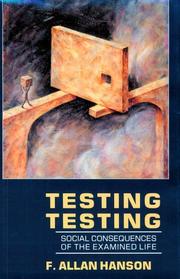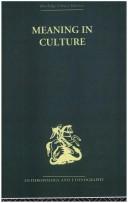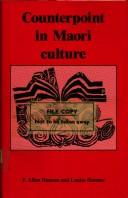| Listing 1 - 10 of 14 | << page >> |
Sort by
|
Book
ISBN: 0710081324 Year: 1975 Publisher: London Routledge & Kegan
Abstract | Keywords | Export | Availability | Bookmark
 Loading...
Loading...Choose an application
- Reference Manager
- EndNote
- RefWorks (Direct export to RefWorks)
Philosophy and psychology of culture --- Ethnology --- -316.75 --- Culture --- Social sciences --- -#SBIB:316.331H120 --- #SBIB:316.331H130 --- Behavioral sciences --- Human sciences --- Sciences, Social --- Social science --- Social studies --- Civilization --- Cultural sociology --- Sociology of culture --- Cultural anthropology --- Ethnography --- Races of man --- Social anthropology --- Anthropology --- Human beings --- Methodology --- Kennissociologie. Ideologie --- Methodologische en epistemologische problemen i.v.m. godsdienstsociologie --- Godsdienstsociologie: methodologie en onderzoekstechnieken --- Social aspects --- Culture. --- Methodology. --- 316.75 Kennissociologie. Ideologie --- #SBIB:316.331H120 --- 316.75 --- Popular culture

ISBN: 0520080602 0520086481 0585135185 Year: 1993 Publisher: Berkeley : University of California Press,
Abstract | Keywords | Export | Availability | Bookmark
 Loading...
Loading...Choose an application
- Reference Manager
- EndNote
- RefWorks (Direct export to RefWorks)
This book is about how our addiction to testing influences both society and ourselves as socially defined persons. The analysis focuses on tests of people, particularly tests in schools, intelligence tests, vocational interest tests, lie detection, integrity tests, and drug tests. Diagnostic psychiatric tests and medical tests are included only tangentially. --From publisher's description.
Examinations --- Self-perception --- Social control --- Examens --- Perception de soi --- Contrôle social --- History --- Social aspects --- Psychological aspects --- Histoire --- Aspect psychologique --- Aspect social --- Social control. --- Psychology --- Social Sciences --- Social conflict --- Sociology --- Liberty --- Pressure groups --- Competitive examinations --- Tests --- Questions and answers --- Educational tests and measurements --- Self-concept --- Self image --- Self-understanding --- Perception --- Self-discrepancy theory --- Self-evaluation --- Psychological aspects. --- History.

ISBN: 0791480445 1429471387 9781429471381 0791470172 0791470180 9780791470176 9780791470183 9780791480441 Year: 2007 Publisher: Albany : State University of New York Press,
Abstract | Keywords | Export | Availability | Bookmark
 Loading...
Loading...Choose an application
- Reference Manager
- EndNote
- RefWorks (Direct export to RefWorks)
2007 CHOICE Outstanding Academic TitleIn this highly original book, anthropologist F. Allan Hanson reveals an entirely unanticipated but vital link between two of the most widely discussed features of contemporary American society: the computer revolution and the culture wars. Hanson argues that the culture wars stem from a divergence in the evolutionary paths of society and culture. Societies have evolved significantly over the last few millennia from small bands of farmers or hunter-gatherers into huge, internally diverse nation-states, while cultures—the closed systems of meanings and symbols that kept small, face-to-face societies together—have failed to keep pace. If cultures became more open, Hanson contends, then the maladaptive rupture between society and culture would be healed and the clashes that currently beset us would be greatly diminished. Interweaving lucid analysis with concrete case studies of common law, education, and other areas of contemporary life, Hanson demonstrates how the widespread use of computers is, in fact, encouraging more originality and open-mindedness, with the potential to ease polarization and calm the culture wars.
Indexing --- Classification --- Culture. --- Information technology --- Books --- Index preparation --- Preparation of indexes --- Subject analysis --- Information organization --- Filing systems --- Knowledge, Classification of --- Cultural sociology --- Culture --- Sociology of culture --- Civilization --- Popular culture --- Social aspects. --- Social aspects --- Technologie de l'information --- Indexation --- Aspect social

ISBN: 0415869250 1315017660 1136540814 9781136540813 9781315017662 9781136540950 1136540954 9781136540882 1136540881 9780415869256 0415330319 9780415330312 Year: 2004 Publisher: Oxon [England] : Routledge,
Abstract | Keywords | Export | Availability | Bookmark
 Loading...
Loading...Choose an application
- Reference Manager
- EndNote
- RefWorks (Direct export to RefWorks)
Meaning in Culture discusses the question of whether 'culture' refers to some superorganic entity that exists in its own right, or is only convenient short-hand for the shared beliefs and behaviour of human individuals. It also investigates the problem of relativism and explores the question of whether anthropology and the other social sciences are really scientific.
First published in 1975.
Culture. --- Ethnology --- Social sciences --- Cultural sociology --- Culture --- Sociology of culture --- Civilization --- Popular culture --- Methodology. --- Social aspects
Book
ISBN: 285430103X 2854300238 Year: 1974 Publisher: Paris Société des Océanistes
Abstract | Keywords | Export | Availability | Bookmark
 Loading...
Loading...Choose an application
- Reference Manager
- EndNote
- RefWorks (Direct export to RefWorks)
Les affaires du corps s’opposent aux affaires de l’esprit, le côté aliments au côté croyance. Ce sont là des manières différentes d’exprimer un clivage fondamental de l’existence et de l’univers tels qu’ils sont perçus par les Rapas. Essentiellement, c’est la distinction entre le profane et le sacré. En d’autres termes, les Rapas incluent dans le « coté nourriture » pae ma’a ou dans le « côté corps » pae tino ces aspects de la vie que nous avons coutume d’appeler économiques, sociaux ou politiques. La religion et la morale appartiennent au « côté esprit », pae varua ou au « côté croyance », paea fa’aro’o. Ce livre traite du « côté corps » de l’existence à Rapa. J’ai cherché d’une part à décrire l’économie, la société et la vie politique telles qu’elles me sont apparues au cours d’un séjour d’une année en 1964. J’ai organisé ces données de manière à les rendre intelligibles aux lecteurs de chez nous ; cependant j’essaierai, dans la mesure du possible, de montrer en quoi les diverses coutumes, croyances et organisations qui composent le « côté nourriture » sont signifiantes pour les Rapas. En cela nous suivons les préceptes de Malinowski : « Notre objectif est de saisir le point de vue de l’indigène, sa relation avec la vie, de comprendre sa vision de son monde ». C’est Malinowski lui-même qui souligne.
Ethnology --- Rapa (French Polynesia) --- Social life and customs. --- Cultural anthropology --- Ethnography --- Races of man --- Social anthropology --- Anthropology --- Human beings --- Rapa (Tubuai Islands) --- Rapa Island (French Polynesia) --- Rapa Iti (French Polynesia) --- Austral Islands (French Polynesia) --- Rapa --- parenté --- société traditionnelle --- histoire de la Polynésie
Book
Year: 1970 Publisher: Boston Little, Brown
Abstract | Keywords | Export | Availability | Bookmark
 Loading...
Loading...Choose an application
- Reference Manager
- EndNote
- RefWorks (Direct export to RefWorks)
Book
ISBN: 9781137342010 Year: 2013 Publisher: New York : Palgrave Macmillan,
Abstract | Keywords | Export | Availability | Bookmark
 Loading...
Loading...Choose an application
- Reference Manager
- EndNote
- RefWorks (Direct export to RefWorks)
"What impact has technology had on cultural meanings, values, and symbols? This anthropological exploration shows how technologies produce novel and sometimes jarring realignments among cultural institutions. Contemporary reproductive, medical, genetic, and information technologies forge unprecedented family relationships, produce a new mode of thinking based on the confluence of artificial and human intelligence, and reconfigure conventional scales of time and space. Taken together, they redefine what it is to be human" "This book is a uniquely original assessment of the consequences of recent technologies for the conventional meanings, shared values and symbols that constitute culture. As with the geological shifts generated by the earth's tectonic plates, technologies produce novel and sometimes jarring realignments among cultural institutions. Lucid prose featuring vivid examples and insightful analysis describes how contemporary reproductive, medical, genetic, and information technologies forge unprecedented family relationships, produce a new mode of thinking based on the confluence of artificial and human intelligence, and reconfigure conventional scales of time and space. Taken together, they redefine what it is to be human"
Technologie --- Technique et civilisation. --- Technology --- Technology and civilization. --- Aspect social. --- Anthropologie. --- Social aspects. --- Anthropological aspects.

ISBN: 0710095465 Year: 1983 Publisher: London Routledge and Kegan Paul
Abstract | Keywords | Export | Availability | Bookmark
 Loading...
Loading...Choose an application
- Reference Manager
- EndNote
- RefWorks (Direct export to RefWorks)
#SBIB:39A76 --- 316.32 <9> --- 392 --- Maori (New Zealand people) --- -Maori (New Zealand people) --- -Etnografie: Oceanië --- Globale samenlevingsvormen--Oceanië. Arctische en Antarctische gebieden --- Zeden en gebruiken in het particuliere leven --- Religion --- Social life and customs --- Religion. --- Social life and customs. --- -392 Zeden en gebruiken in het particuliere leven --- 316.32 <9> Globale samenlevingsvormen--Oceanië. Arctische en Antarctische gebieden --- Etnografie: Oceanië --- 392 Zeden en gebruiken in het particuliere leven --- 392 Customs, manners, usage in private life --- Customs, manners, usage in private life
Book
ISBN: 0816186456 Year: 1984 Publisher: Boston (Mass.) : Hall,
Abstract | Keywords | Export | Availability | Bookmark
 Loading...
Loading...Choose an application
- Reference Manager
- EndNote
- RefWorks (Direct export to RefWorks)
Art --- Art, Australasian --- Bibliography.
Book
Abstract | Keywords | Export | Availability | Bookmark
 Loading...
Loading...Choose an application
- Reference Manager
- EndNote
- RefWorks (Direct export to RefWorks)
| Listing 1 - 10 of 14 | << page >> |
Sort by
|

 Search
Search Feedback
Feedback About UniCat
About UniCat  Help
Help News
News